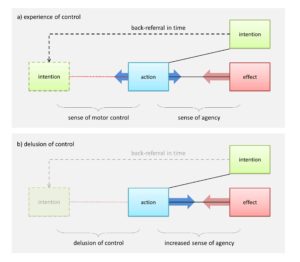The existence of free will is fiercely debated in neuroscience and philosophy. Many scientific theories deny the possibility of a phenomenal experience which is not driven by neuronal processes, ultimately concluding that free will cannot exist. This conclusion leaves us with the question about the origin of the experience of free will.
 One model states that intentions are generated after the corresponding actions, and then are back-dated in time, thereby giving rise to the impression that they caused the action.
One model states that intentions are generated after the corresponding actions, and then are back-dated in time, thereby giving rise to the impression that they caused the action.
In this paper I argue that this alleged mechanism of temporal recalibration might be disrupted in some cases of schizophrenia presenting with delusions of control (i.e., the experience that own movements are controlled by external forces). Paradoxically, this implies that the experience of motor control in these patients is – from a strictly objective perspective – closer to reality than the impressions of healthy humans.
Key publications:
Riemer, M. (2018). Delusions of control in schizophrenia: Resistant to the mind’s best trick? Schizophrenia Research, 197: 98-103. [link]